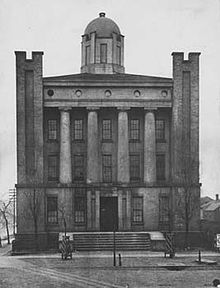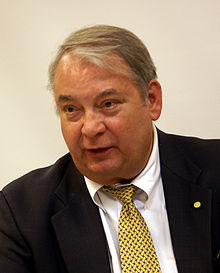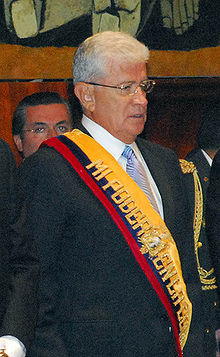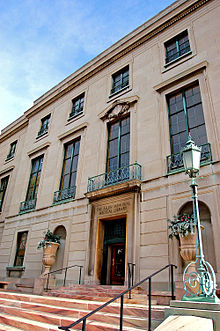- Case Western Reserve University School of Medicine
-
Case Western Reserve University School of Medicine 
Established 1843 School type Private Dean Pamela B. Davis, MD, PhD Location Cleveland, Ohio, USA Enrollment 1,206
616 MD
155 MD-PhD
435 PhDFaculty 11,049 USNWR ranking 22 Website http://casemed.case.edu 
Case Western Reserve School of Medicine (CWRU SOM, CaseMed) is one of the graduate schools of Case Western Reserve University, and is located in the University Circle neighborhood of Cleveland, Ohio. The School of Medicine is among the top 25 medical schools in America and is the top-ranked medical school of Ohio in research per U.S. News & World Report.[1] In 2007, 6,077 applications for admission were received and 1,235 were interviewed for 185 spots, with an acceptance rate of 7.6%.
Additionally, Case School of Medicine is the largest biomedical research center in Ohio.[2]
Prospective students have the option of three degree paths leading to a medical degree at the School of Medicine: the "University Program;" the "College Program" at the Cleveland Clinic; and the Medical Scientist Training Program (MSTP).
In 2002, the School of Medicine became only the third institution in history to receive the best review possible from the body that grants accreditation to U.S. and Canadian medical degree programs, the Liaison Committee on Medical Education.[3]
Contents
History
On November 1, 1843, five faculty members and sixty-seven students began the first medical lectures at the Medical Department of Western Reserve College (also known as the Cleveland Medical College).[4]
The School of Medicine has trained medical students, served the community, and been at the forefront of discovery in the City of Cleveland for over 165 years. A historical photo gallery is available at: http://casemed.case.edu/about/photogallery.cfm
 Emily Blackwell – 1854 MD alumnus. CaseMed graduated six of the first seven women to receive U.S. allopathic medical degrees.
Emily Blackwell – 1854 MD alumnus. CaseMed graduated six of the first seven women to receive U.S. allopathic medical degrees.
Women in Medicine: In 1852, the medical school became the second in the U.S. to graduate a woman, Nancy Talbot Clarke. 1854 MD alumnus, Emily Blackwell became the third woman in the US to receive a regular medical degree. Six of the first seven women in the United States to receive medical degrees from recognized allopathic medical schools graduated from Western Reserve University between 1850 and 1856.
Flexner Survey:
In 1909, Arbraham Flexner, a graduate of Johns Hopkins University surveyed and evaluated each of the one hundred and fifty-five medical schools then extant in North America. The results of his investigation proved shocking: most "medical schools," for example, had entrance requirements no more stringent than either high school diploma or "rudiments or the recollection of a common school education."
 Cover of the Medical School catalog of 1868-69.
Cover of the Medical School catalog of 1868-69.
Only sixteen schools required at least two years of college as an entrance requirement, and of these, Johns Hopkins, Harvard, and Western Reserve were still the only ones to require an undergraduate degree. Although Johns Hopkins represented his ideal, Flexner also singled out the Medical Department of Western Reserve University for its praiseworthy admission standards and facilities. Flexner referred to Western Reserve as "already one of the substantial schools in the country." In a letter to Western Reserve president Charles Franklin Thwing he said, "The Medical Department of Western Reserve University is, next to Johns Hopkins..., the best in the country."
Western Reserve Curriculum: A little over forty years later, in 1952, the Western Reserve University School of Medicine revolutionized medical education with the "new curriculum of 1952" and more advanced stages in 1968. This was the most progressive medical curriculum in the country at that time, integrating the basic and clinical sciences.
Research History: Development of the modern technique for human blood transfusion using a cannula to connect blood vessels; first large-scale medical research project on humans in a study linking iodine with goiter prevention; pioneering use of drinking water chlorination; discovery of the cause of ptomaine food poisoning and development of serum against it and similar poisons; first surgical treatments of coronary artery disease; discovery of early treatment of strep throat infections to prevent rheumatic fever; development of an early heart-lung machine to be used during open-heart surgery; discovery of the Hageman factor in blood clotting, a major discovery in blood coagulation research; first description of how staphylococcus infections are transmitted, leading to required hand-washing between patients in infant nurseries; first description of what was later named Reye's syndrome; research leading to FDA approval of clozapine, the most advanced treatment for schizophrenia in 40 years at the time; discovery of the gene for osteoarthritis; and creation with Athersys, Inc., of the world's first human artificial chromosome.
CaseMed Today: Today the CWRU School of Medicine is the largest biomedical research institution in Ohio and one of the largest in the nation, as measured by funding received from the National Institutes of Health. The School of Medicine has eight Nobel Prize holders among its alumni and former and current faculty, and also has graduates who have distinguished themselves as U.S. Surgeons General: Jesse Steinfeld, MD, and David Satcher, MD, PhD, and the current the Director of the CDC, Julie Gerberding, MD.
Notable Alumni and Faculty
- Shuvo Roy, Professor, Inventor of Artificial Kidney
- Nancy Talbot Clarke (1852 MD alumnus)[5] & Emily Blackwell (1854 MD alumnus)[6] - second and third women in the United States to earn a medical degree. Six of the first seven women in the United States to receive medical degrees from recognized allopathic medical schools graduated from Western Reserve University (as it was called then) between 1850 and 1856.
- George Washington Crile (1887 MD alumnus) - Performed first blood transfusion. Established Lakeside Hospital of what is now University Hospitals Case Medical Center,[7] and later co-founded Cleveland Clinic.[8] Crile was a graduate of Wooster Medical College which merged to form modern day CaseMed.[9][10][11]
Nobel Laureates
 John J.R. Macleod, 1923 Nobel Prize winner for discovering Insulin and Western Reserve University Professor of Physiology teaching class.
John J.R. Macleod, 1923 Nobel Prize winner for discovering Insulin and Western Reserve University Professor of Physiology teaching class.
ALUMNI NOBEL LAUREATES-
- 1980 - Paul Berg (1952 PhD in Biochemistry alumnus), Nobel Prize in Chemistry for pioneering research in recombinant DNA technology.[12]
- 1985 & 1997 - H. Jack Geiger (1958 MD alumnus), Though not a recipient of Nobel prize directly, he was the founding member and past president of Physicians for Human Rights[13][14] which shared the 1997 Nobel Peace Prize[15] as part of International Campaign to Ban Landmines. He also was a founding member of Physicians for Social Responsibility which shared the 1985 Nobel Peace Prize as part of International Physicians for the Prevention of Nuclear War.
- 1994 - Alfred Gilman (1969 MD/PhD alumnus), Nobel Prize in Physiology or Medicine for co-discovery of G Proteins[16]
- 1998 - Ferid Murad (1965 MD/PhD alumnus), Nobel Prize in Physiology or Medicine for role in the discovery of nitric oxide in cardiovascular signaling [17]
- 2003 - Peter C. Agre (1978 Internal Medicine alumnus), Nobel Prize in Chemistry for discovering Aquaporin protein that clarified how salts and water are transported out of and into the cells of the body, leading to a better understanding of many diseases of the kidneys, heart, muscles and nervous system.[18]
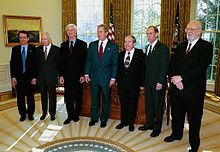 Case Alumni who received 2003 Nobel Prizes - Paul C. Lauterbur and Peter Agre (1st and 2nd from right) with President George Walker Bush
Case Alumni who received 2003 Nobel Prizes - Paul C. Lauterbur and Peter Agre (1st and 2nd from right) with President George Walker Bush
FACULTY NOBEL LAUREATES-
- 1923 - John J.R. Macleod (Professor of Physiology), Nobel Prize in Physiology or Medicine, for discovery of Insulin[19]
- 1938 - Corneille J.F. Heymans, Nobel Prize in Physiology or Medicine for work on carotid sinus reflex [20]
- 1954 - Frederick C. Robbins (Dean of CaseMed), Nobel Prize in Physiology or Medicine, for work on polio virus, which led to development of polio vaccines; past president of the Institute of Medicine of the National Academy of Sciences.[21]
- 1971 - Earl W. Sutherland (Chair of Pharmacology), Nobel Prize in Physiology or Medicine, for establishing identity and importance of cyclic adenosine monophosphate or cyclic AMP in regulation of cell metabolism.[22] Sutherland discovered cAMP while at CaseMed.
- 1988 - George H. Hitchings, Nobel Prize in Physiology or Medicine, for research leading to development of drugs to treat leukemia, organ transplant rejection, gout, herpes virus, and AIDS-related bacterial and pulmonary infections.[23]
Public Health
- Jesse Leonard Steinfeld (1949 MD alumnus) - U.S. Surgeon General (1969 to 1973), most noted for achieving widespread fluoridation of water, requiring prescription drugs to be effective, and strengthening the Surgeon General's Warning on cigarettes.[24]
- David Satcher (1970 MD/PhD alumnus) - U.S. Surgeon General under President Bill Clinton, and first African-American director of the Centers for Disease Control and Prevention [25]
- Julie L. Gerberding (1981 MD alumnus) - first woman director of the Centers for Disease Control and Prevention [26]
- Michael Ehlert (2007 MD alumnus) - 2007-08 National President of the American Medical Student Association.[27]
- John Brockman (MD Class of 2012) - 2010-11 National President of the American Medical Student Association.[28]
Other
- 1912 - Professor Roger Perkins pioneered the process of chlorinating drinking water.[29]
- 1915 - Henry Gerstenberger (alumnus and pediatrics professor) first simulated milk formula for infants.
- 1927 - Immunologist Enrique Ecker discovered the cause of ptomaine food poisoning and development of an antiserum.
- 1935 - Claude Beck (Surgery residency alumnus; 1924-1971 Professor of Cardiovascular Surgery - first such position in US)[30] -
- Performed first surgical treatment of coronary artery disease (1935)[31]
- Performed first defibrillation using machine he built with James Rand (1947)[32]
- Developed concept of Beck's Triad
- Started the first CPR teaching course for medical professionals (1950).
- 1950s - Professor Frederick Cross developed first heart-lung machine for use in open heart surgeries.
- 1961 - Professor Austin Weisburger performed first successful genetic alteration of human cells in a test tube.
- 1969 - William Insull, MD describes the role of cholesterol in blood vessel disease.
- 1975 - Discovery that human renin, an enzyme produced by the kidney, is involved in hypertension
- 1990 - National team led by rheumatologist Roland Moskowitz discovers gene for osteoarthritis.
- 1991 - James A. Schulak, MD, and colleagues perform first triple organ transplant in Ohio-a kidney, liver and pancreas.
- 1997 - Team led by Professor Huntington Willard (Chair of Genetics) create world's first artificial human chromosome.
- M. Scott Peck (1963 MD alumnus) - psychiatrist and author of The Road Less Traveled
- Amit Patel - stem cell surgeon who demonstrated stem cell transplantation can treat congestive heart failure.
- 2004 - Craig Smith (1977 MD alumnus) leads the cardiac surgery team which performs President Bill Clinton's coronary artery bypass surgery.[33]
- Richard Walsh, MD (Chair of Medicine, Case Medical Center) - Current editor of Hurst's The Heart Manual of Cardiology.[34]
- Peter Tippett (1983 MD/PhD alumnus) - Inventor of Norton AntiVirus.[35][36]
- Alfredo Palacio (Internal Medicine alumnus) - President of Ecuador (2005–2007).
Ranking
2010 US News and World Report National Rankings[37]
Medicine Area National Rank Overall 20 Biomedical Engineering 11 Family Medicine 15 Pediatrics 16 2008 NIH research rankings[38]
Area National Rank Overall 17 Nutrition 1 Pediatrics 3 Orthopedics 6 Dermatology 7 Family Medicine 12 Urology 14 - Case School of Medicine is the largest biomedical research center in Ohio.[39]
Education
Building on its reputation for innovation in medical education, the Case Western Reserve University School of Medicine introduced the WR2 curriculum with the class entering in 2006. The goal of the new curriculum is to unite the disciplines of medicine and public health. It is designed to emphasize independent study, and scheduling choices, while providing mentored experiences in research during the first 18 months of school. All students are required to complete a dedicated 4 month research block during their second, third, or fourth year of study.
Major Teaching Affiliates
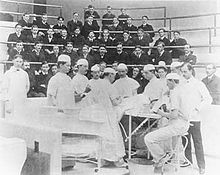 In 1896, the first affiliation agreement was approved between Western Reserve University and University Hospitals of Cleveland[40]
In 1896, the first affiliation agreement was approved between Western Reserve University and University Hospitals of Cleveland[40]
- University Hospitals Case Medical Center
- Cleveland Clinic
- MetroHealth Medical Center
- Louis Stokes Cleveland Department of Veterans Affairs Medical Center
Other Teaching Affiliates
- St. Vincent Charity Hospital
- The Free Medical Clinic of Greater Cleveland
Degree Programs
In addition to the traditional MD degree, students have the option of completing one of several dual degree programs of varying lengths at no additional cost. Currently, the school has dual degree programs that offer:
- MD/PhD
- MD/DMD - Combined Medical Doctor and Doctor of Dental Medicine Program
- MD/MPH - Combined Medical Doctor and Master of Public Health
- MD/MBA - Combined Medical Doctor and Master of Business Administration
- MD/MA in Bioethics
- MD/MS in Applied Anatomy
- MD/MS in Biomedical Investigation
- MD/MS in Biomedical Engineering
- MD/MA or MD/PhD in Anthropology
Student life
Societies
Case Medical School is divided into four societies named after famous CaseMed alums. Upon matriculation, students in the University Program are assigned to a society. Each has a Society Dean who serves as an academic adviser to the students. The societies are:
- Frederick C. Robbins Society
- Emily Blackwell Society
- David Satcher Society
- Joseph Wearn Society
Every year, the four societies compete in "ISC Picnic" for the infamous Society Cup in a series of events (e.g. soccer, flag football, relay races etc.) to test physical talents of the students in each society. The Satcher Society currently holds the cup after a decisive win over Robbins who held the cup in 2007.
Doc Opera
Every year, students at Case Western Reserve SOM write, direct and perform a full length musical parody, lampooning Case Western Reserve, their professors, and themselves. In recent years, the show has been a benefit for the Free Medical Clinic of Greater Cleveland.
Role in Cleveland and Ohio
During 2007, the economic impact of the School of Medicine and its affiliates on the State of Ohio equaled $5.82 billion and accounted for more than 65,000 Ohio jobs.[41] The role of Case Western Reserve University in the Cleveland economy has been reported on by The Economist magazine.[42]
In popular culture
- The 1997 Air Force One (movie) was in part filmed on Case campus. The opening scene depicting the presidential palace of the leader of Kazakhstan was shot at Severance Hall - home of the Cleveland Orchestra adjacent to Case campus. Also seen are several landmarks of Case including the Thwing Center (the student union) and the Allen Memorial Medical Library.
- In the 1999 film Being John Malkovich, Mary Kay Place's character - Floris - is mentioned to have received "her doctorate in speech impedimentology from Case Western."
- In the 2003 book Mountains Beyond Mountains, Tracy Kidder talks about Paul Farmer choosing to apply to only two MD/PhD-anthropology programs in the nation - CaseMed and Harvard Medical School.[43]
- The 2004 Vice-Presidential Debate between then Vice-President Dick Cheney and Senator John Edwards was held on Case Western campus.[44]
- In the 2006 film The Oh in Ohio, Paul Rudd's character - Jack - becomes romantically involved with a Case student Kristin (played by Mischa Barton). In one scene, Jack drops Kristin off at the "Case Biophysics building," which is actually the Frank Gehry designed Peter B. Lewis Building at Case's Weatherhead School of Management. In this scene, a number of actual Case Western Reserve students were cast as extras, and had minor speaking roles.
- The Onion magazine has reported on a fictional story about Cleveland Cavaliers' LeBron James being amazed at the studying skills of a Case student.[45]
- In 2010, the show The Deep End on ABC features a main character, Addy Fisher, who graduated from Case.[46]
- In 2010, the show Boston Med on ABC features CaseMed alumnus and current faculty, Jeff Ustin, MD,[47] as well as alumni Rahul Rathod, MD and Elizabeth Blume, MD.[48][49]
See also
- List of Case Western people
- Case School of Dental Medicine
References
- ^ http://grad-schools.usnews.rankingsandreviews.com/best-graduate-schools/top-medical-schools/research-rankings
- ^ Case-UH largest biomedical research center in Ohio - http://casemed.case.edu/clinicalactivities/affiliates.cfm
- ^ http://www.case.edu/bulletin/09-11/medicine_general.htm
- ^ http://casemed.case.edu/about/history.cfm
- ^ http://casemed.case.edu/about/photogallery.cfm?StartRecord=10
- ^ http://casemed.case.edu/student_affairs/blackwell.cfm
- ^ http://www.casesurgery.com/residency/general/chair.htm
- ^ http://my.clevelandclinic.org/about/overview/mission_history.aspx
- ^ http://www.chhistory.org/People.php?PeopleContent=DrGeorgeWashingtonCrile
- ^ http://www.case.edu/artsci/dittrick/site2/museum/online/smallpox/schools.htm
- ^ http://www.case.edu/artsci/dittrick/cemetery/stop13.htm
- ^ Case Alum Paul Berg Nobel page. http://nobelprize.org/nobel_prizes/chemistry/laureates/1980/berg-cv.html
- ^ http://www.gwumc.edu/sphhs/departments/healthpolicy/ggprogram/geiger.cfm
- ^ http://physiciansforhumanrights.org/about/board_bios/jack-geiger.html
- ^ http://physiciansforhumanrights.org/library/news-2006-10-21.html
- ^ http://pharmacology.case.edu/about/nobel.aspx
- ^ Case Alum Ferid Murad Nobel page.http://nobelprize.org/nobel_prizes/medicine/laureates/1998/murad-autobio.html
- ^ http://nobelprize.org/nobel_prizes/chemistry/laureates/2003/agre-autobio.html
- ^ http://casemed.case.edu/about/photogallery.cfm?StartRecord=22
- ^ http://nobelprize.org/nobel_prizes/medicine/laureates/1938/heymans-bio.html
- ^ http://nobelprize.org/nobel_prizes/medicine/laureates/1954/robbins-bio.html
- ^ http://pharmacology.case.edu/about/nobel.aspx
- ^ http://nobelprize.org/nobel_prizes/medicine/laureates/1988/hitchings-autobio.html
- ^ http://www.surgeongeneral.gov/about/previous/biosteinfeld.htm
- ^ http://casemed.case.edu/student_affairs/satcher.cfm
- ^ http://www.cleveland.com/nation/index.ssf/2009/01/dr_julie_gerberding_resigns_as.html
- ^ http://blog.case.edu/case-news/2007/03/29/amsa
- ^ http://www.amsa.org/AMSA/Homepage/About/NationalLeadership/NationalPresident.aspx
- ^ http://casemed.case.edu/about/facts.cfm
- ^ Case faculty Claude Beck - http://www.hrsonline.org/News/ep-history/notable-figures/claudebeck.cfm
- ^ Case faculty Claude Beck - http://www.hrsonline.org/News/ep-history/notable-figures/claudebeck.cfm
- ^ Case faculty Claude Beck's first defibrillation article - "Ventricular fibrillation of long duration abolished by electric shock", JAMA, 1947
- ^ Case alums leads Bill Clinton's surgical team: http://www.nytimes.com/2004/09/07/national/07doctor.html?_r=1
- ^ Richard Walsh: http://search.barnesandnoble.com/Hursts-The-Heart/Valentin-Fuster/e/9780071478861/?itm=1&usri=hurst+s+the+heart
- ^ http://www.case.edu/alumni/notable/tech.html
- ^ Case alum Peter Tippett developed Norton AntiVirus - http://ciso.issa.org/about/peter-tippett.php
- ^ US News #20 in 2010: http://grad-schools.usnews.rankingsandreviews.com/best-graduate-schools/top-medical-schools/research-rankings
- ^ 2008 NIH research rankings - http://www.case.edu/president/cir/cirrankings.htm
- ^ Case-UH largest biomedical research center in Ohio - http://casemed.case.edu/clinicalactivities/affiliates.cfm
- ^ http://casemed.case.edu/about/photogallery.cfm?StartRecord=16
- ^ CaseMed's $5.82 billion impact on Cleveland - http://casemed.case.edu/about/facts.cfm
- ^ Economist article on Case's role in Cleveland - http://www.economist.com/world/unitedstates/displaystory.cfm?story_id=15213793
- ^ Kidder T. Mountains Beyond Mountains: The Quest of Dr. Paul Farmer, A Man Who Would Cure the World. Random House (2004). p64.
- ^ Cheney and Edwards Vice presidential debate: http://www.washingtonpost.com/wp-srv/politics/debatereferee/debate_1005.html
- ^ The Onion and Case - http://www.theonion.com/content/node/52821
- ^ Case on The Deep End - http://www.hulu.com/watch/122229/the-deep-end-pilot
- ^ Boston Med - http://bostonmed.abcnews.go.com/doctors-and-nurses/jeff-ustin
- ^ http://bostonmed.abcnews.go.com/doctors-and-nurses/rahul-rathod
- ^ Boston Med - http://bostonmed.abcnews.go.com/doctors-and-nurses/elizabeth-blume
External links
- CWRU School of Medicine
- Doc Opera
- The Free Medical Clinic of Greater Cleveland
- St Vincent Charity Hospital
Campus Adelbert Hall · Allen Memorial Medical Library · Flora Stone Mather Quadrangle · Kent H. Smith Quadrangle · Case Medical Center · Mather House · Rainbow Babies & Children's Hospital · University Circle · Warner and Swasey Observatory · Village at 115
People Student Life Athletics · The Observer · Student body · WRUW-FM
Traditions
Categories:- Case Western Reserve University
- Schools of medicine in Ohio
- Educational institutions established in 1843
- Healthcare in Cleveland, Ohio
Wikimedia Foundation. 2010.

